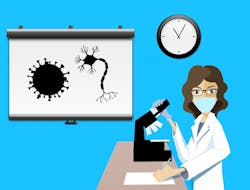More than 90% of pharmaceuticals fail in clinical trials, despite the fact that by the time a drug is ready to be tested in humans, it’s typically already been studied in Petri dishes and animal models for years, according to a news release from Duke University.
A new custom-developed tool, called an organ-on-a-chip, shows potential for making pre-clinical testing more accurate. At Duke, Shyni Varghese, PhD, an expert in the new technology, is teaming up with colleagues to assess its potential in evaluating COVID-19 drug candidates.
An organ-on-a-chip is a platform representing a miniaturized version of a particular tissue, say the heart, which is generated from human cells that’s been encouraged to grow into particular cell types, such as cardiac cells. What makes the organ-on-a-chip special is the incorporation of a microfluidic system, a series of tiny channels that carry fluid. The microfluidic system can be used to simulate blood flow or to create movement in the cells, such as a rhythmic movement to mimic the action of breathing. It can also be used to bathe the cells with a drug to evaluate how well the drug works.
And all this fits on what looks like a microscope slide.
“It’s a 3-D cell culture with an architecture that mimics certain cardinal features of the tissue,” Varghese says.
The promise of the organ-on-a-chip comes from the fact that it’s dynamic and three-dimensional. For those reasons, it has the potential to more effectively winnow out pharmaceuticals that are likely to be ineffective or unsafe before those pharmaceuticals get to clinical trials in humans.
In the COVID project, she and colleagues in the biomedical engineering department are divvying up organ systems according to their experience and expertise. She’ll be working with a lung-on-a-chip, while George Truskey, PhD, will be using a chip to study the vascular system, and Nenad Bursac, PhD, will be looking at the heart. All three of them will be evaluating the effectiveness of the candidate drugs in their respective organs.
It’s important to look at multiple organ systems because COVID doesn’t damage only the lungs; it can damage the heart and cause blood clots in the vascular system as well. A drug that protects the lungs from the disease may not be very valuable if it doesn’t stop the virus from causing trouble in the heart.
The researchers and their lab members will “infect” the organs-on-chips with the coronavirus spike protein (not a live virus), and then perfuse the tissue with a drug candidate to see if it can stop the spike protein from binding to the human cells. They will also be looking to see if the drug harms the organ tissue in the process.
Evaluating preclinical treatments is just one of the many ways that organs-on-chips can advance science. Varghese finds them to be an invaluable tool when she’s exploring basic questions and building knowledge about how organs work — knowledge that can lead to solutions and applications down the line.

